Health and Social Care: Person Centred Approaches Report
VerifiedAdded on 2022/12/23
|11
|3298
|75
Report
AI Summary
This report delves into person-centred approaches within health and social care, examining key concepts such as person-centred values (privacy, dignity, independence, etc.) and their practical application. It explains how care plans are central to applying these values, emphasizing the importance of understanding individual preferences, wishes, and needs through effective communication and respect for beliefs. The report details factors contributing to individual wellbeing, including social connections, financial stability, and a sense of purpose. It also explores the principle of active participation, outlining ways to ensure individuals are involved in their care and how to support them in agreeing on the implementation of active participation. Furthermore, the report addresses the significance of informed consent, describing factors influencing an individual's capacity to provide consent and steps to take when consent cannot be readily established. This comprehensive overview provides a valuable resource for understanding and implementing person-centred care practices.
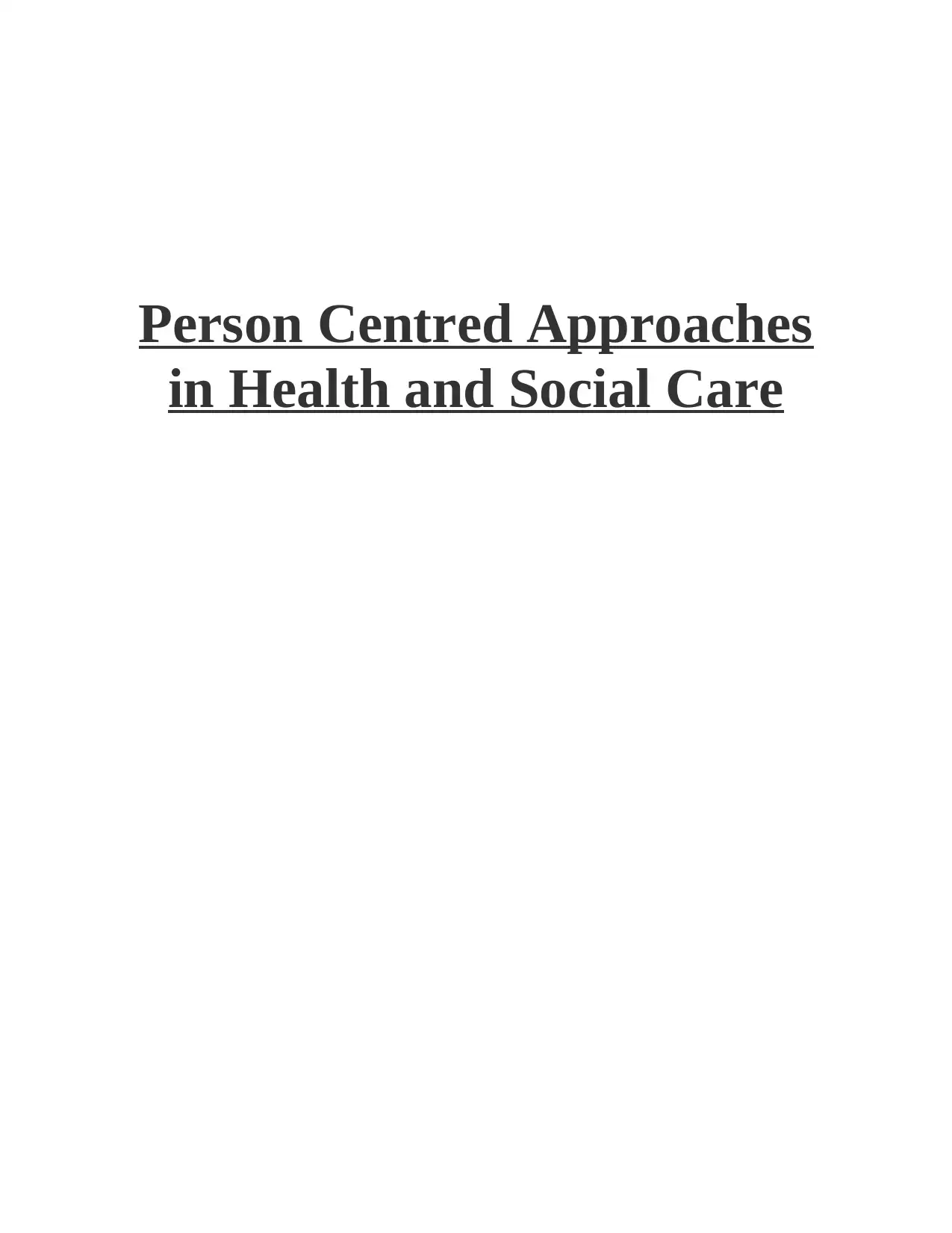
Person Centred Approaches
in Health and Social Care
in Health and Social Care
Paraphrase This Document
Need a fresh take? Get an instant paraphrase of this document with our AI Paraphraser
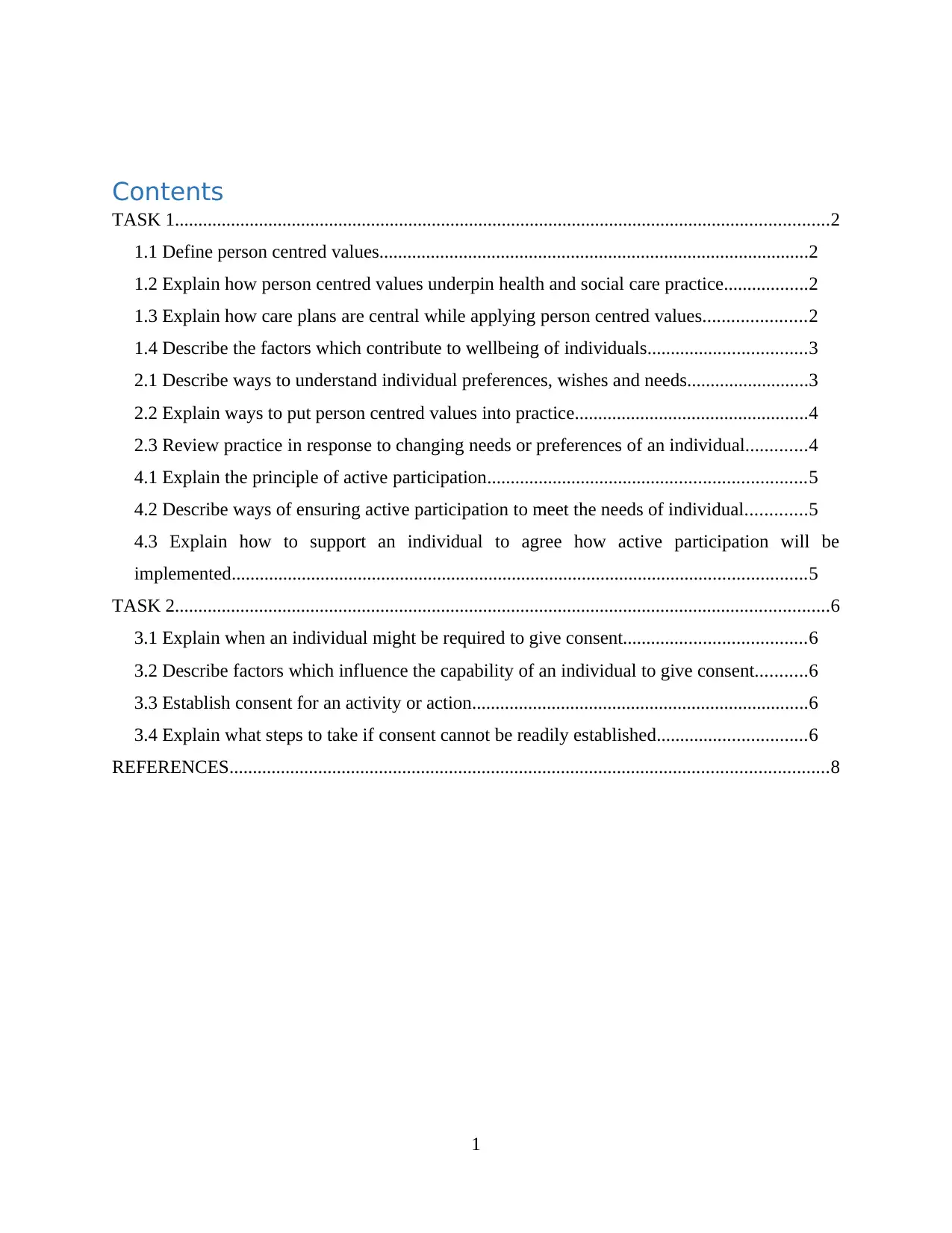
Contents
TASK 1............................................................................................................................................2
1.1 Define person centred values............................................................................................2
1.2 Explain how person centred values underpin health and social care practice..................2
1.3 Explain how care plans are central while applying person centred values......................2
1.4 Describe the factors which contribute to wellbeing of individuals..................................3
2.1 Describe ways to understand individual preferences, wishes and needs..........................3
2.2 Explain ways to put person centred values into practice..................................................4
2.3 Review practice in response to changing needs or preferences of an individual.............4
4.1 Explain the principle of active participation....................................................................5
4.2 Describe ways of ensuring active participation to meet the needs of individual.............5
4.3 Explain how to support an individual to agree how active participation will be
implemented...........................................................................................................................5
TASK 2............................................................................................................................................6
3.1 Explain when an individual might be required to give consent.......................................6
3.2 Describe factors which influence the capability of an individual to give consent...........6
3.3 Establish consent for an activity or action........................................................................6
3.4 Explain what steps to take if consent cannot be readily established................................6
REFERENCES................................................................................................................................8
1
TASK 1............................................................................................................................................2
1.1 Define person centred values............................................................................................2
1.2 Explain how person centred values underpin health and social care practice..................2
1.3 Explain how care plans are central while applying person centred values......................2
1.4 Describe the factors which contribute to wellbeing of individuals..................................3
2.1 Describe ways to understand individual preferences, wishes and needs..........................3
2.2 Explain ways to put person centred values into practice..................................................4
2.3 Review practice in response to changing needs or preferences of an individual.............4
4.1 Explain the principle of active participation....................................................................5
4.2 Describe ways of ensuring active participation to meet the needs of individual.............5
4.3 Explain how to support an individual to agree how active participation will be
implemented...........................................................................................................................5
TASK 2............................................................................................................................................6
3.1 Explain when an individual might be required to give consent.......................................6
3.2 Describe factors which influence the capability of an individual to give consent...........6
3.3 Establish consent for an activity or action........................................................................6
3.4 Explain what steps to take if consent cannot be readily established................................6
REFERENCES................................................................................................................................8
1
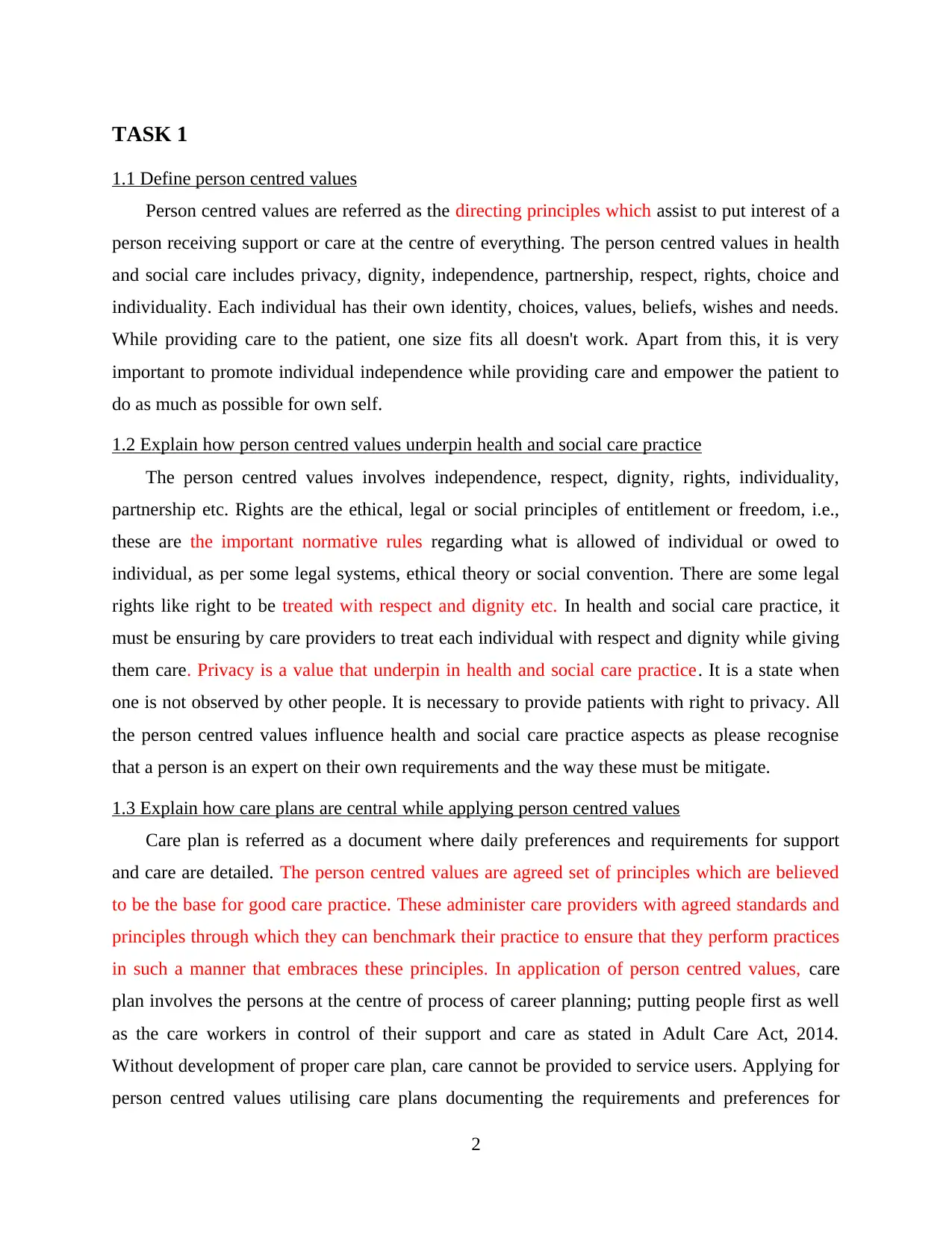
TASK 1
1.1 Define person centred values
Person centred values are referred as the directing principles which assist to put interest of a
person receiving support or care at the centre of everything. The person centred values in health
and social care includes privacy, dignity, independence, partnership, respect, rights, choice and
individuality. Each individual has their own identity, choices, values, beliefs, wishes and needs.
While providing care to the patient, one size fits all doesn't work. Apart from this, it is very
important to promote individual independence while providing care and empower the patient to
do as much as possible for own self.
1.2 Explain how person centred values underpin health and social care practice
The person centred values involves independence, respect, dignity, rights, individuality,
partnership etc. Rights are the ethical, legal or social principles of entitlement or freedom, i.e.,
these are the important normative rules regarding what is allowed of individual or owed to
individual, as per some legal systems, ethical theory or social convention. There are some legal
rights like right to be treated with respect and dignity etc. In health and social care practice, it
must be ensuring by care providers to treat each individual with respect and dignity while giving
them care. Privacy is a value that underpin in health and social care practice. It is a state when
one is not observed by other people. It is necessary to provide patients with right to privacy. All
the person centred values influence health and social care practice aspects as please recognise
that a person is an expert on their own requirements and the way these must be mitigate.
1.3 Explain how care plans are central while applying person centred values
Care plan is referred as a document where daily preferences and requirements for support
and care are detailed. The person centred values are agreed set of principles which are believed
to be the base for good care practice. These administer care providers with agreed standards and
principles through which they can benchmark their practice to ensure that they perform practices
in such a manner that embraces these principles. In application of person centred values, care
plan involves the persons at the centre of process of career planning; putting people first as well
as the care workers in control of their support and care as stated in Adult Care Act, 2014.
Without development of proper care plan, care cannot be provided to service users. Applying for
person centred values utilising care plans documenting the requirements and preferences for
2
1.1 Define person centred values
Person centred values are referred as the directing principles which assist to put interest of a
person receiving support or care at the centre of everything. The person centred values in health
and social care includes privacy, dignity, independence, partnership, respect, rights, choice and
individuality. Each individual has their own identity, choices, values, beliefs, wishes and needs.
While providing care to the patient, one size fits all doesn't work. Apart from this, it is very
important to promote individual independence while providing care and empower the patient to
do as much as possible for own self.
1.2 Explain how person centred values underpin health and social care practice
The person centred values involves independence, respect, dignity, rights, individuality,
partnership etc. Rights are the ethical, legal or social principles of entitlement or freedom, i.e.,
these are the important normative rules regarding what is allowed of individual or owed to
individual, as per some legal systems, ethical theory or social convention. There are some legal
rights like right to be treated with respect and dignity etc. In health and social care practice, it
must be ensuring by care providers to treat each individual with respect and dignity while giving
them care. Privacy is a value that underpin in health and social care practice. It is a state when
one is not observed by other people. It is necessary to provide patients with right to privacy. All
the person centred values influence health and social care practice aspects as please recognise
that a person is an expert on their own requirements and the way these must be mitigate.
1.3 Explain how care plans are central while applying person centred values
Care plan is referred as a document where daily preferences and requirements for support
and care are detailed. The person centred values are agreed set of principles which are believed
to be the base for good care practice. These administer care providers with agreed standards and
principles through which they can benchmark their practice to ensure that they perform practices
in such a manner that embraces these principles. In application of person centred values, care
plan involves the persons at the centre of process of career planning; putting people first as well
as the care workers in control of their support and care as stated in Adult Care Act, 2014.
Without development of proper care plan, care cannot be provided to service users. Applying for
person centred values utilising care plans documenting the requirements and preferences for
2
⊘ This is a preview!⊘
Do you want full access?
Subscribe today to unlock all pages.

Trusted by 1+ million students worldwide
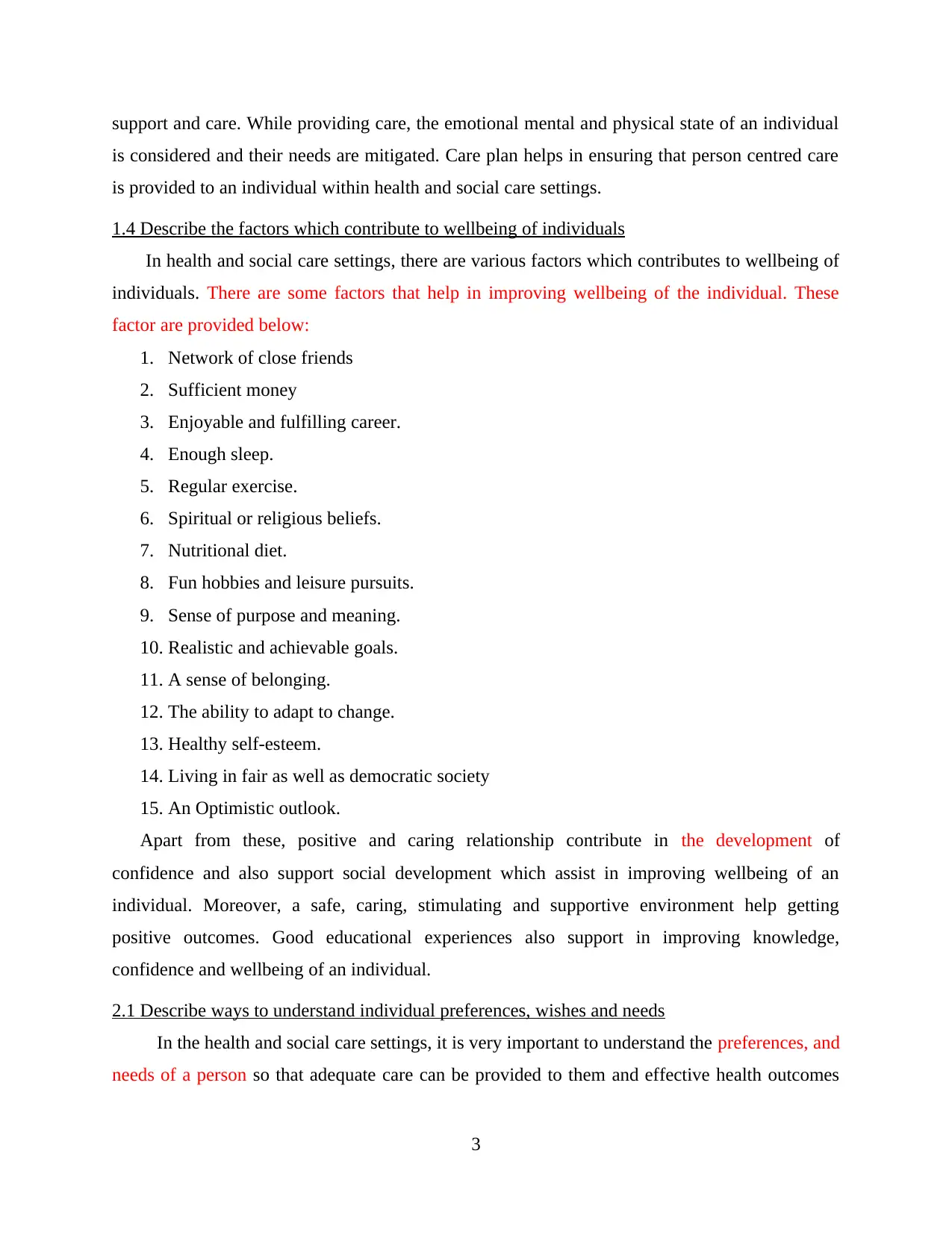
support and care. While providing care, the emotional mental and physical state of an individual
is considered and their needs are mitigated. Care plan helps in ensuring that person centred care
is provided to an individual within health and social care settings.
1.4 Describe the factors which contribute to wellbeing of individuals
In health and social care settings, there are various factors which contributes to wellbeing of
individuals. There are some factors that help in improving wellbeing of the individual. These
factor are provided below:
1. Network of close friends
2. Sufficient money
3. Enjoyable and fulfilling career.
4. Enough sleep.
5. Regular exercise.
6. Spiritual or religious beliefs.
7. Nutritional diet.
8. Fun hobbies and leisure pursuits.
9. Sense of purpose and meaning.
10. Realistic and achievable goals.
11. A sense of belonging.
12. The ability to adapt to change.
13. Healthy self-esteem.
14. Living in fair as well as democratic society
15. An Optimistic outlook.
Apart from these, positive and caring relationship contribute in the development of
confidence and also support social development which assist in improving wellbeing of an
individual. Moreover, a safe, caring, stimulating and supportive environment help getting
positive outcomes. Good educational experiences also support in improving knowledge,
confidence and wellbeing of an individual.
2.1 Describe ways to understand individual preferences, wishes and needs
In the health and social care settings, it is very important to understand the preferences, and
needs of a person so that adequate care can be provided to them and effective health outcomes
3
is considered and their needs are mitigated. Care plan helps in ensuring that person centred care
is provided to an individual within health and social care settings.
1.4 Describe the factors which contribute to wellbeing of individuals
In health and social care settings, there are various factors which contributes to wellbeing of
individuals. There are some factors that help in improving wellbeing of the individual. These
factor are provided below:
1. Network of close friends
2. Sufficient money
3. Enjoyable and fulfilling career.
4. Enough sleep.
5. Regular exercise.
6. Spiritual or religious beliefs.
7. Nutritional diet.
8. Fun hobbies and leisure pursuits.
9. Sense of purpose and meaning.
10. Realistic and achievable goals.
11. A sense of belonging.
12. The ability to adapt to change.
13. Healthy self-esteem.
14. Living in fair as well as democratic society
15. An Optimistic outlook.
Apart from these, positive and caring relationship contribute in the development of
confidence and also support social development which assist in improving wellbeing of an
individual. Moreover, a safe, caring, stimulating and supportive environment help getting
positive outcomes. Good educational experiences also support in improving knowledge,
confidence and wellbeing of an individual.
2.1 Describe ways to understand individual preferences, wishes and needs
In the health and social care settings, it is very important to understand the preferences, and
needs of a person so that adequate care can be provided to them and effective health outcomes
3
Paraphrase This Document
Need a fresh take? Get an instant paraphrase of this document with our AI Paraphraser
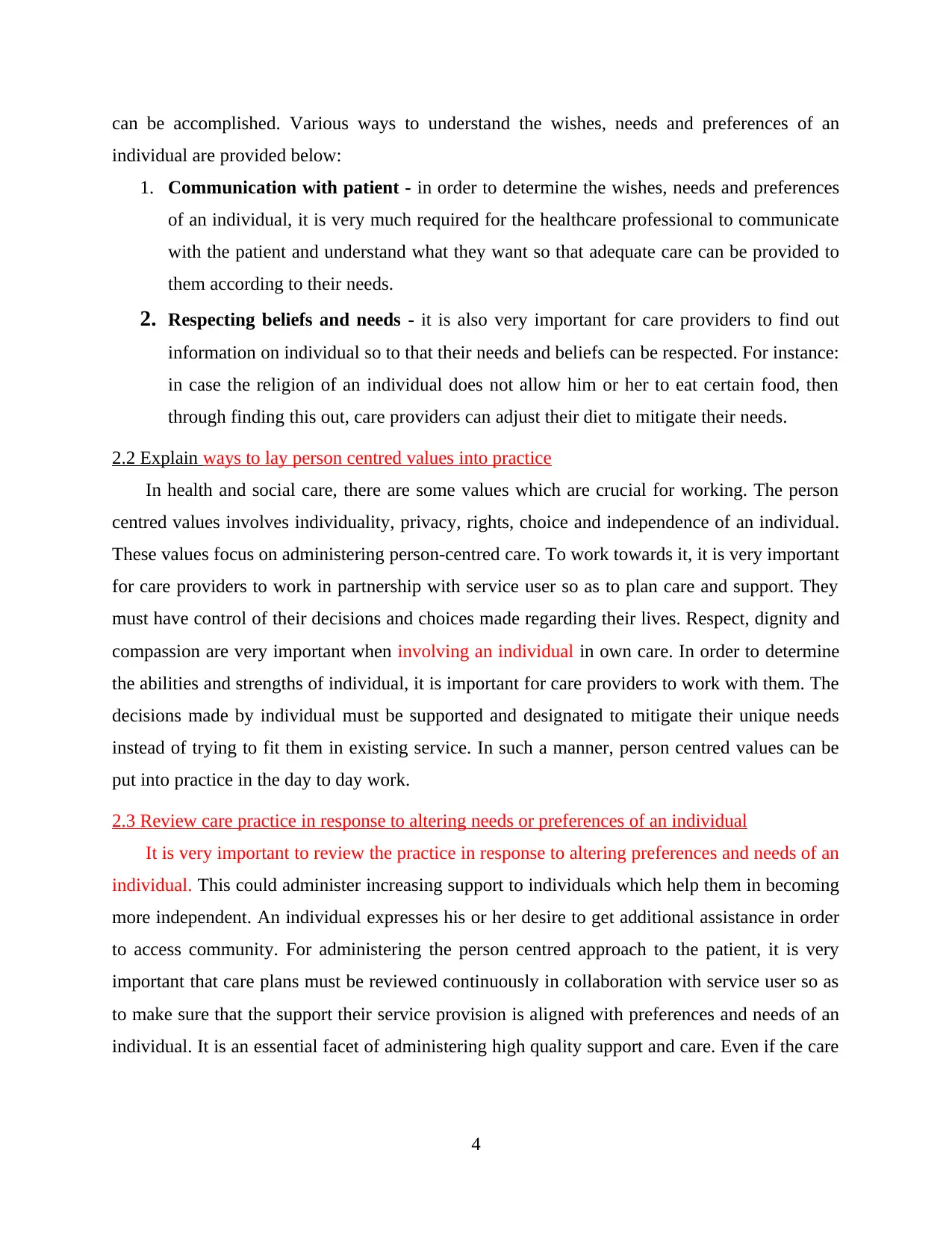
can be accomplished. Various ways to understand the wishes, needs and preferences of an
individual are provided below:
1. Communication with patient - in order to determine the wishes, needs and preferences
of an individual, it is very much required for the healthcare professional to communicate
with the patient and understand what they want so that adequate care can be provided to
them according to their needs.
2. Respecting beliefs and needs - it is also very important for care providers to find out
information on individual so to that their needs and beliefs can be respected. For instance:
in case the religion of an individual does not allow him or her to eat certain food, then
through finding this out, care providers can adjust their diet to mitigate their needs.
2.2 Explain ways to lay person centred values into practice
In health and social care, there are some values which are crucial for working. The person
centred values involves individuality, privacy, rights, choice and independence of an individual.
These values focus on administering person-centred care. To work towards it, it is very important
for care providers to work in partnership with service user so as to plan care and support. They
must have control of their decisions and choices made regarding their lives. Respect, dignity and
compassion are very important when involving an individual in own care. In order to determine
the abilities and strengths of individual, it is important for care providers to work with them. The
decisions made by individual must be supported and designated to mitigate their unique needs
instead of trying to fit them in existing service. In such a manner, person centred values can be
put into practice in the day to day work.
2.3 Review care practice in response to altering needs or preferences of an individual
It is very important to review the practice in response to altering preferences and needs of an
individual. This could administer increasing support to individuals which help them in becoming
more independent. An individual expresses his or her desire to get additional assistance in order
to access community. For administering the person centred approach to the patient, it is very
important that care plans must be reviewed continuously in collaboration with service user so as
to make sure that the support their service provision is aligned with preferences and needs of an
individual. It is an essential facet of administering high quality support and care. Even if the care
4
individual are provided below:
1. Communication with patient - in order to determine the wishes, needs and preferences
of an individual, it is very much required for the healthcare professional to communicate
with the patient and understand what they want so that adequate care can be provided to
them according to their needs.
2. Respecting beliefs and needs - it is also very important for care providers to find out
information on individual so to that their needs and beliefs can be respected. For instance:
in case the religion of an individual does not allow him or her to eat certain food, then
through finding this out, care providers can adjust their diet to mitigate their needs.
2.2 Explain ways to lay person centred values into practice
In health and social care, there are some values which are crucial for working. The person
centred values involves individuality, privacy, rights, choice and independence of an individual.
These values focus on administering person-centred care. To work towards it, it is very important
for care providers to work in partnership with service user so as to plan care and support. They
must have control of their decisions and choices made regarding their lives. Respect, dignity and
compassion are very important when involving an individual in own care. In order to determine
the abilities and strengths of individual, it is important for care providers to work with them. The
decisions made by individual must be supported and designated to mitigate their unique needs
instead of trying to fit them in existing service. In such a manner, person centred values can be
put into practice in the day to day work.
2.3 Review care practice in response to altering needs or preferences of an individual
It is very important to review the practice in response to altering preferences and needs of an
individual. This could administer increasing support to individuals which help them in becoming
more independent. An individual expresses his or her desire to get additional assistance in order
to access community. For administering the person centred approach to the patient, it is very
important that care plans must be reviewed continuously in collaboration with service user so as
to make sure that the support their service provision is aligned with preferences and needs of an
individual. It is an essential facet of administering high quality support and care. Even if the care
4
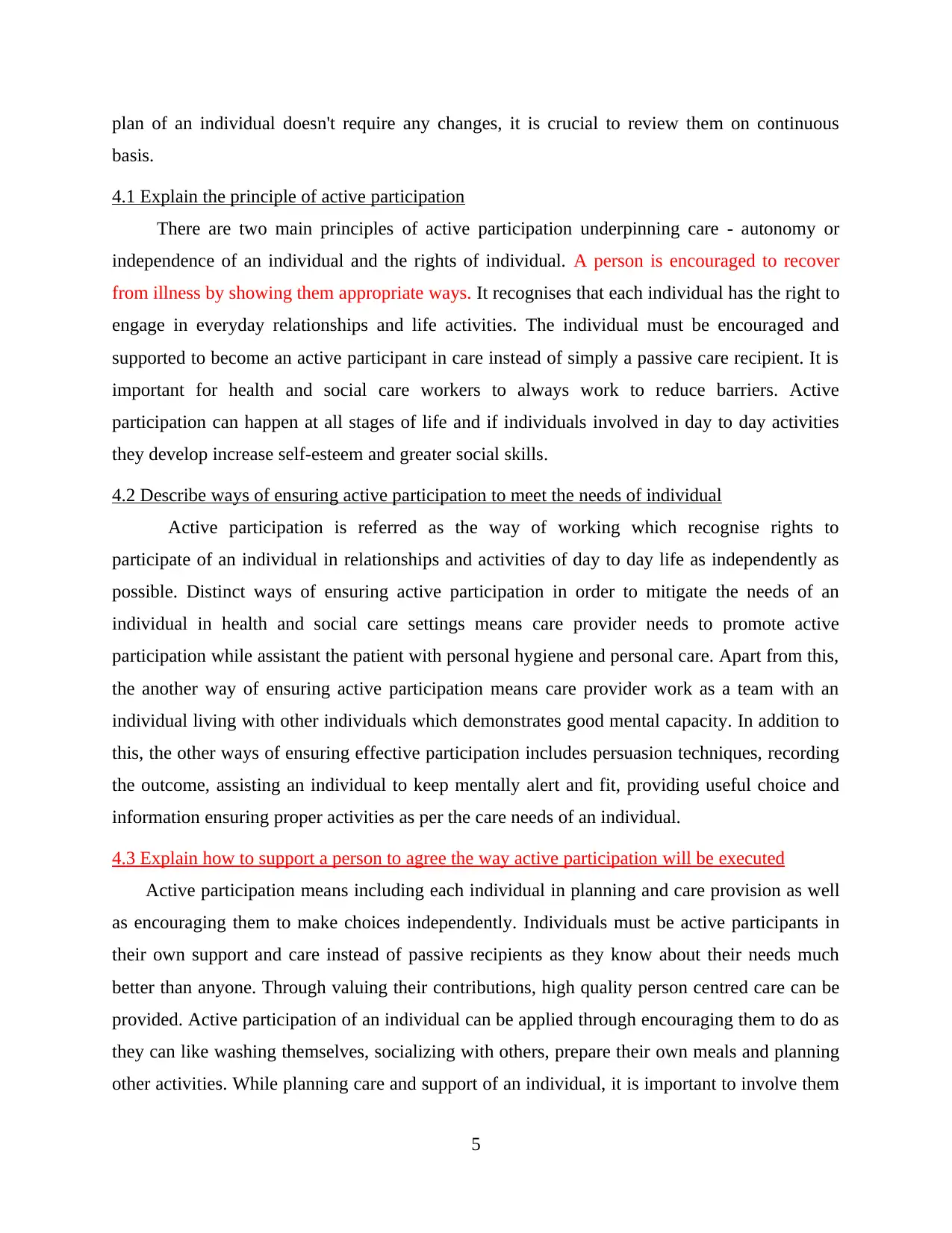
plan of an individual doesn't require any changes, it is crucial to review them on continuous
basis.
4.1 Explain the principle of active participation
There are two main principles of active participation underpinning care - autonomy or
independence of an individual and the rights of individual. A person is encouraged to recover
from illness by showing them appropriate ways. It recognises that each individual has the right to
engage in everyday relationships and life activities. The individual must be encouraged and
supported to become an active participant in care instead of simply a passive care recipient. It is
important for health and social care workers to always work to reduce barriers. Active
participation can happen at all stages of life and if individuals involved in day to day activities
they develop increase self-esteem and greater social skills.
4.2 Describe ways of ensuring active participation to meet the needs of individual
Active participation is referred as the way of working which recognise rights to
participate of an individual in relationships and activities of day to day life as independently as
possible. Distinct ways of ensuring active participation in order to mitigate the needs of an
individual in health and social care settings means care provider needs to promote active
participation while assistant the patient with personal hygiene and personal care. Apart from this,
the another way of ensuring active participation means care provider work as a team with an
individual living with other individuals which demonstrates good mental capacity. In addition to
this, the other ways of ensuring effective participation includes persuasion techniques, recording
the outcome, assisting an individual to keep mentally alert and fit, providing useful choice and
information ensuring proper activities as per the care needs of an individual.
4.3 Explain how to support a person to agree the way active participation will be executed
Active participation means including each individual in planning and care provision as well
as encouraging them to make choices independently. Individuals must be active participants in
their own support and care instead of passive recipients as they know about their needs much
better than anyone. Through valuing their contributions, high quality person centred care can be
provided. Active participation of an individual can be applied through encouraging them to do as
they can like washing themselves, socializing with others, prepare their own meals and planning
other activities. While planning care and support of an individual, it is important to involve them
5
basis.
4.1 Explain the principle of active participation
There are two main principles of active participation underpinning care - autonomy or
independence of an individual and the rights of individual. A person is encouraged to recover
from illness by showing them appropriate ways. It recognises that each individual has the right to
engage in everyday relationships and life activities. The individual must be encouraged and
supported to become an active participant in care instead of simply a passive care recipient. It is
important for health and social care workers to always work to reduce barriers. Active
participation can happen at all stages of life and if individuals involved in day to day activities
they develop increase self-esteem and greater social skills.
4.2 Describe ways of ensuring active participation to meet the needs of individual
Active participation is referred as the way of working which recognise rights to
participate of an individual in relationships and activities of day to day life as independently as
possible. Distinct ways of ensuring active participation in order to mitigate the needs of an
individual in health and social care settings means care provider needs to promote active
participation while assistant the patient with personal hygiene and personal care. Apart from this,
the another way of ensuring active participation means care provider work as a team with an
individual living with other individuals which demonstrates good mental capacity. In addition to
this, the other ways of ensuring effective participation includes persuasion techniques, recording
the outcome, assisting an individual to keep mentally alert and fit, providing useful choice and
information ensuring proper activities as per the care needs of an individual.
4.3 Explain how to support a person to agree the way active participation will be executed
Active participation means including each individual in planning and care provision as well
as encouraging them to make choices independently. Individuals must be active participants in
their own support and care instead of passive recipients as they know about their needs much
better than anyone. Through valuing their contributions, high quality person centred care can be
provided. Active participation of an individual can be applied through encouraging them to do as
they can like washing themselves, socializing with others, prepare their own meals and planning
other activities. While planning care and support of an individual, it is important to involve them
5
⊘ This is a preview!⊘
Do you want full access?
Subscribe today to unlock all pages.

Trusted by 1+ million students worldwide
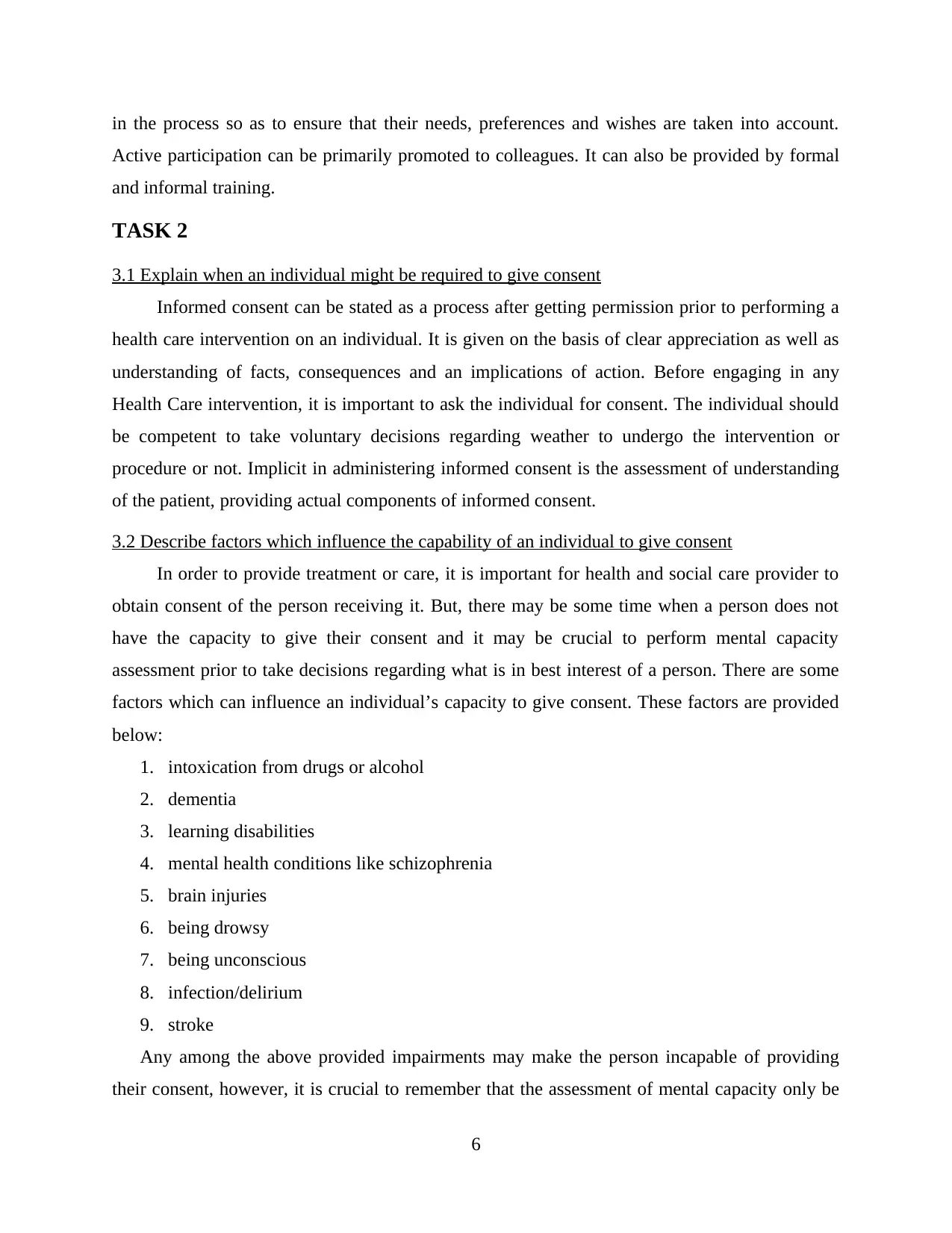
in the process so as to ensure that their needs, preferences and wishes are taken into account.
Active participation can be primarily promoted to colleagues. It can also be provided by formal
and informal training.
TASK 2
3.1 Explain when an individual might be required to give consent
Informed consent can be stated as a process after getting permission prior to performing a
health care intervention on an individual. It is given on the basis of clear appreciation as well as
understanding of facts, consequences and an implications of action. Before engaging in any
Health Care intervention, it is important to ask the individual for consent. The individual should
be competent to take voluntary decisions regarding weather to undergo the intervention or
procedure or not. Implicit in administering informed consent is the assessment of understanding
of the patient, providing actual components of informed consent.
3.2 Describe factors which influence the capability of an individual to give consent
In order to provide treatment or care, it is important for health and social care provider to
obtain consent of the person receiving it. But, there may be some time when a person does not
have the capacity to give their consent and it may be crucial to perform mental capacity
assessment prior to take decisions regarding what is in best interest of a person. There are some
factors which can influence an individual’s capacity to give consent. These factors are provided
below:
1. intoxication from drugs or alcohol
2. dementia
3. learning disabilities
4. mental health conditions like schizophrenia
5. brain injuries
6. being drowsy
7. being unconscious
8. infection/delirium
9. stroke
Any among the above provided impairments may make the person incapable of providing
their consent, however, it is crucial to remember that the assessment of mental capacity only be
6
Active participation can be primarily promoted to colleagues. It can also be provided by formal
and informal training.
TASK 2
3.1 Explain when an individual might be required to give consent
Informed consent can be stated as a process after getting permission prior to performing a
health care intervention on an individual. It is given on the basis of clear appreciation as well as
understanding of facts, consequences and an implications of action. Before engaging in any
Health Care intervention, it is important to ask the individual for consent. The individual should
be competent to take voluntary decisions regarding weather to undergo the intervention or
procedure or not. Implicit in administering informed consent is the assessment of understanding
of the patient, providing actual components of informed consent.
3.2 Describe factors which influence the capability of an individual to give consent
In order to provide treatment or care, it is important for health and social care provider to
obtain consent of the person receiving it. But, there may be some time when a person does not
have the capacity to give their consent and it may be crucial to perform mental capacity
assessment prior to take decisions regarding what is in best interest of a person. There are some
factors which can influence an individual’s capacity to give consent. These factors are provided
below:
1. intoxication from drugs or alcohol
2. dementia
3. learning disabilities
4. mental health conditions like schizophrenia
5. brain injuries
6. being drowsy
7. being unconscious
8. infection/delirium
9. stroke
Any among the above provided impairments may make the person incapable of providing
their consent, however, it is crucial to remember that the assessment of mental capacity only be
6
Paraphrase This Document
Need a fresh take? Get an instant paraphrase of this document with our AI Paraphraser
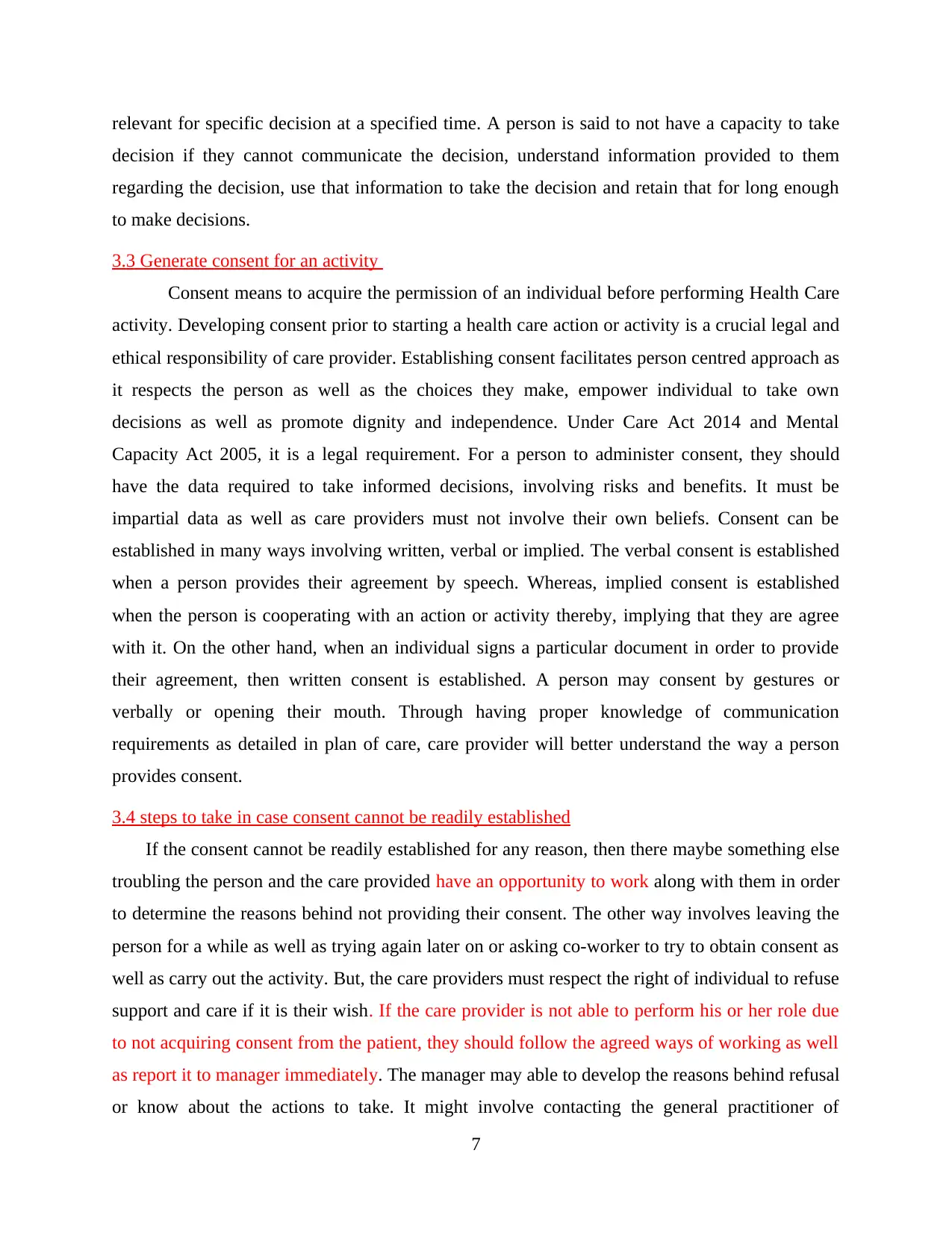
relevant for specific decision at a specified time. A person is said to not have a capacity to take
decision if they cannot communicate the decision, understand information provided to them
regarding the decision, use that information to take the decision and retain that for long enough
to make decisions.
3.3 Generate consent for an activity
Consent means to acquire the permission of an individual before performing Health Care
activity. Developing consent prior to starting a health care action or activity is a crucial legal and
ethical responsibility of care provider. Establishing consent facilitates person centred approach as
it respects the person as well as the choices they make, empower individual to take own
decisions as well as promote dignity and independence. Under Care Act 2014 and Mental
Capacity Act 2005, it is a legal requirement. For a person to administer consent, they should
have the data required to take informed decisions, involving risks and benefits. It must be
impartial data as well as care providers must not involve their own beliefs. Consent can be
established in many ways involving written, verbal or implied. The verbal consent is established
when a person provides their agreement by speech. Whereas, implied consent is established
when the person is cooperating with an action or activity thereby, implying that they are agree
with it. On the other hand, when an individual signs a particular document in order to provide
their agreement, then written consent is established. A person may consent by gestures or
verbally or opening their mouth. Through having proper knowledge of communication
requirements as detailed in plan of care, care provider will better understand the way a person
provides consent.
3.4 steps to take in case consent cannot be readily established
If the consent cannot be readily established for any reason, then there maybe something else
troubling the person and the care provided have an opportunity to work along with them in order
to determine the reasons behind not providing their consent. The other way involves leaving the
person for a while as well as trying again later on or asking co-worker to try to obtain consent as
well as carry out the activity. But, the care providers must respect the right of individual to refuse
support and care if it is their wish. If the care provider is not able to perform his or her role due
to not acquiring consent from the patient, they should follow the agreed ways of working as well
as report it to manager immediately. The manager may able to develop the reasons behind refusal
or know about the actions to take. It might involve contacting the general practitioner of
7
decision if they cannot communicate the decision, understand information provided to them
regarding the decision, use that information to take the decision and retain that for long enough
to make decisions.
3.3 Generate consent for an activity
Consent means to acquire the permission of an individual before performing Health Care
activity. Developing consent prior to starting a health care action or activity is a crucial legal and
ethical responsibility of care provider. Establishing consent facilitates person centred approach as
it respects the person as well as the choices they make, empower individual to take own
decisions as well as promote dignity and independence. Under Care Act 2014 and Mental
Capacity Act 2005, it is a legal requirement. For a person to administer consent, they should
have the data required to take informed decisions, involving risks and benefits. It must be
impartial data as well as care providers must not involve their own beliefs. Consent can be
established in many ways involving written, verbal or implied. The verbal consent is established
when a person provides their agreement by speech. Whereas, implied consent is established
when the person is cooperating with an action or activity thereby, implying that they are agree
with it. On the other hand, when an individual signs a particular document in order to provide
their agreement, then written consent is established. A person may consent by gestures or
verbally or opening their mouth. Through having proper knowledge of communication
requirements as detailed in plan of care, care provider will better understand the way a person
provides consent.
3.4 steps to take in case consent cannot be readily established
If the consent cannot be readily established for any reason, then there maybe something else
troubling the person and the care provided have an opportunity to work along with them in order
to determine the reasons behind not providing their consent. The other way involves leaving the
person for a while as well as trying again later on or asking co-worker to try to obtain consent as
well as carry out the activity. But, the care providers must respect the right of individual to refuse
support and care if it is their wish. If the care provider is not able to perform his or her role due
to not acquiring consent from the patient, they should follow the agreed ways of working as well
as report it to manager immediately. The manager may able to develop the reasons behind refusal
or know about the actions to take. It might involve contacting the general practitioner of
7

individual or next of kin of an individual. It is also necessary to always make a record of
activities and actions that the care provider have taken to obtain consent, involving the reasons
provided by an individual for refusal and the conversations associated with it.
8
activities and actions that the care provider have taken to obtain consent, involving the reasons
provided by an individual for refusal and the conversations associated with it.
8
⊘ This is a preview!⊘
Do you want full access?
Subscribe today to unlock all pages.

Trusted by 1+ million students worldwide
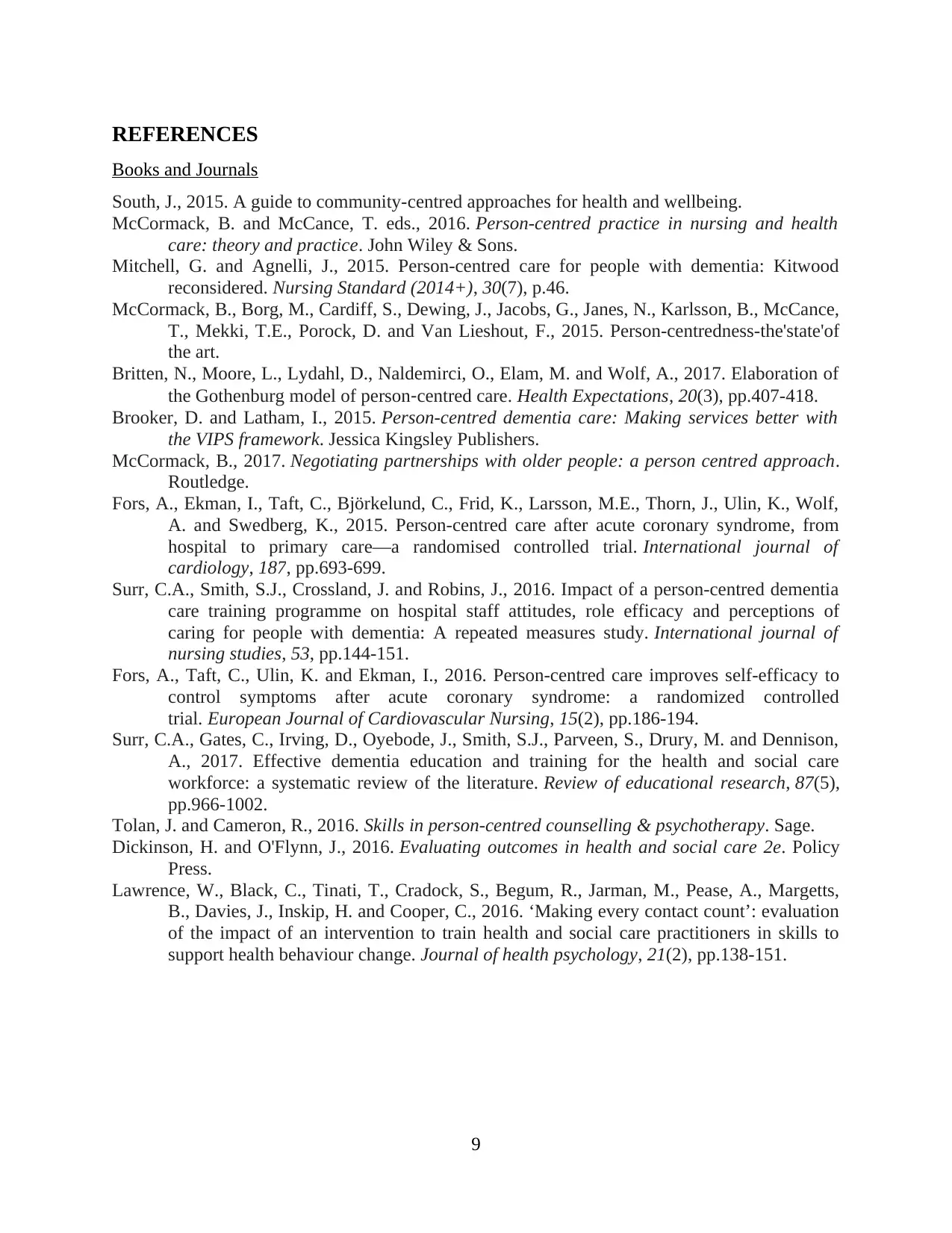
REFERENCES
Books and Journals
South, J., 2015. A guide to community-centred approaches for health and wellbeing.
McCormack, B. and McCance, T. eds., 2016. Person-centred practice in nursing and health
care: theory and practice. John Wiley & Sons.
Mitchell, G. and Agnelli, J., 2015. Person-centred care for people with dementia: Kitwood
reconsidered. Nursing Standard (2014+), 30(7), p.46.
McCormack, B., Borg, M., Cardiff, S., Dewing, J., Jacobs, G., Janes, N., Karlsson, B., McCance,
T., Mekki, T.E., Porock, D. and Van Lieshout, F., 2015. Person-centredness-the'state'of
the art.
Britten, N., Moore, L., Lydahl, D., Naldemirci, O., Elam, M. and Wolf, A., 2017. Elaboration of
the Gothenburg model of person‐centred care. Health Expectations, 20(3), pp.407-418.
Brooker, D. and Latham, I., 2015. Person-centred dementia care: Making services better with
the VIPS framework. Jessica Kingsley Publishers.
McCormack, B., 2017. Negotiating partnerships with older people: a person centred approach.
Routledge.
Fors, A., Ekman, I., Taft, C., Björkelund, C., Frid, K., Larsson, M.E., Thorn, J., Ulin, K., Wolf,
A. and Swedberg, K., 2015. Person-centred care after acute coronary syndrome, from
hospital to primary care—a randomised controlled trial. International journal of
cardiology, 187, pp.693-699.
Surr, C.A., Smith, S.J., Crossland, J. and Robins, J., 2016. Impact of a person-centred dementia
care training programme on hospital staff attitudes, role efficacy and perceptions of
caring for people with dementia: A repeated measures study. International journal of
nursing studies, 53, pp.144-151.
Fors, A., Taft, C., Ulin, K. and Ekman, I., 2016. Person-centred care improves self-efficacy to
control symptoms after acute coronary syndrome: a randomized controlled
trial. European Journal of Cardiovascular Nursing, 15(2), pp.186-194.
Surr, C.A., Gates, C., Irving, D., Oyebode, J., Smith, S.J., Parveen, S., Drury, M. and Dennison,
A., 2017. Effective dementia education and training for the health and social care
workforce: a systematic review of the literature. Review of educational research, 87(5),
pp.966-1002.
Tolan, J. and Cameron, R., 2016. Skills in person-centred counselling & psychotherapy. Sage.
Dickinson, H. and O'Flynn, J., 2016. Evaluating outcomes in health and social care 2e. Policy
Press.
Lawrence, W., Black, C., Tinati, T., Cradock, S., Begum, R., Jarman, M., Pease, A., Margetts,
B., Davies, J., Inskip, H. and Cooper, C., 2016. ‘Making every contact count’: evaluation
of the impact of an intervention to train health and social care practitioners in skills to
support health behaviour change. Journal of health psychology, 21(2), pp.138-151.
9
Books and Journals
South, J., 2015. A guide to community-centred approaches for health and wellbeing.
McCormack, B. and McCance, T. eds., 2016. Person-centred practice in nursing and health
care: theory and practice. John Wiley & Sons.
Mitchell, G. and Agnelli, J., 2015. Person-centred care for people with dementia: Kitwood
reconsidered. Nursing Standard (2014+), 30(7), p.46.
McCormack, B., Borg, M., Cardiff, S., Dewing, J., Jacobs, G., Janes, N., Karlsson, B., McCance,
T., Mekki, T.E., Porock, D. and Van Lieshout, F., 2015. Person-centredness-the'state'of
the art.
Britten, N., Moore, L., Lydahl, D., Naldemirci, O., Elam, M. and Wolf, A., 2017. Elaboration of
the Gothenburg model of person‐centred care. Health Expectations, 20(3), pp.407-418.
Brooker, D. and Latham, I., 2015. Person-centred dementia care: Making services better with
the VIPS framework. Jessica Kingsley Publishers.
McCormack, B., 2017. Negotiating partnerships with older people: a person centred approach.
Routledge.
Fors, A., Ekman, I., Taft, C., Björkelund, C., Frid, K., Larsson, M.E., Thorn, J., Ulin, K., Wolf,
A. and Swedberg, K., 2015. Person-centred care after acute coronary syndrome, from
hospital to primary care—a randomised controlled trial. International journal of
cardiology, 187, pp.693-699.
Surr, C.A., Smith, S.J., Crossland, J. and Robins, J., 2016. Impact of a person-centred dementia
care training programme on hospital staff attitudes, role efficacy and perceptions of
caring for people with dementia: A repeated measures study. International journal of
nursing studies, 53, pp.144-151.
Fors, A., Taft, C., Ulin, K. and Ekman, I., 2016. Person-centred care improves self-efficacy to
control symptoms after acute coronary syndrome: a randomized controlled
trial. European Journal of Cardiovascular Nursing, 15(2), pp.186-194.
Surr, C.A., Gates, C., Irving, D., Oyebode, J., Smith, S.J., Parveen, S., Drury, M. and Dennison,
A., 2017. Effective dementia education and training for the health and social care
workforce: a systematic review of the literature. Review of educational research, 87(5),
pp.966-1002.
Tolan, J. and Cameron, R., 2016. Skills in person-centred counselling & psychotherapy. Sage.
Dickinson, H. and O'Flynn, J., 2016. Evaluating outcomes in health and social care 2e. Policy
Press.
Lawrence, W., Black, C., Tinati, T., Cradock, S., Begum, R., Jarman, M., Pease, A., Margetts,
B., Davies, J., Inskip, H. and Cooper, C., 2016. ‘Making every contact count’: evaluation
of the impact of an intervention to train health and social care practitioners in skills to
support health behaviour change. Journal of health psychology, 21(2), pp.138-151.
9
Paraphrase This Document
Need a fresh take? Get an instant paraphrase of this document with our AI Paraphraser

10
1 out of 11
Related Documents
Your All-in-One AI-Powered Toolkit for Academic Success.
+13062052269
info@desklib.com
Available 24*7 on WhatsApp / Email
![[object Object]](/_next/static/media/star-bottom.7253800d.svg)
Unlock your academic potential
Copyright © 2020–2026 A2Z Services. All Rights Reserved. Developed and managed by ZUCOL.





